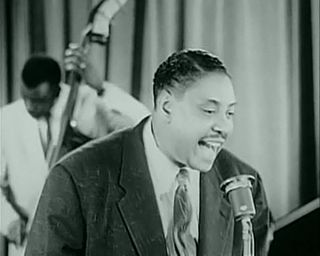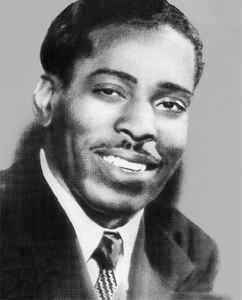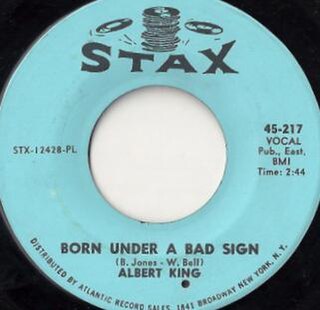Related Research Articles

Rhythm and blues, frequently abbreviated as R&B or R'n'B, is a genre of popular music that originated within African-American communities in the 1940s. The term was originally used by record companies to describe recordings marketed predominantly to African Americans, at a time when "rocking, jazz based music ... [with a] heavy, insistent beat" was becoming more popular. In the commercial rhythm and blues music typical of the 1950s through the 1970s, the bands usually consisted of a piano, one or two guitars, bass, drums, one or more saxophones, and sometimes background vocalists. R&B lyrical themes often encapsulate the African-American history and experience of pain and the quest for freedom and joy, as well as triumphs and failures in terms of societal racism, oppression, relationships, economics, and aspirations.

Ska is a music genre that originated in Jamaica in the late 1950s and was the precursor to rocksteady and reggae. It combined elements of Caribbean mento and calypso with American jazz and rhythm and blues. Ska is characterized by a walking bass line accented with rhythms on the off beat. It was developed in Jamaica in the 1960s when Stranger Cole, Prince Buster, Clement "Coxsone" Dodd, and Duke Reid formed sound systems to play American rhythm and blues and then began recording their own songs. In the early 1960s, ska was the dominant music genre of Jamaica and was popular with British mods and with many skinheads.

Wynonie Harris was an American blues shouter best remembered as a singer of upbeat songs, featuring humorous, often ribald lyrics. He had fifteen Top 10 hits between 1946 and 1952. Harris is attributed by many music scholars to be one of the founding fathers of rock and roll. His "Good Rocking Tonight" is mentioned at least as a precursor to rock and roll.
Jump blues is an up-tempo style of blues, jazz, and boogie woogie usually played by small groups and featuring horn instruments. It was popular in the 1940s and was a precursor of rhythm and blues and rock and roll. Appreciation of jump blues was renewed in the 1990s as part of the swing revival.

New Orleans rhythm and blues is a style of rhythm and blues that originated in New Orleans. It was a direct precursor to rock and roll and strongly influenced ska. Instrumentation typically includes drums, bass, piano, horns, electric guitar, and vocals. The style is characterized by syncopated "second line" rhythms, a strong backbeat, and soulful vocals. Artists such as Roy Brown, Dave Bartholomew, and Fats Domino are representative of the New Orleans R&B sound.

Johnny Otis was a first generation Greek-American singer, musician, composer, bandleader, record producer, and talent scout. He was a seminal influence on American R&B and rock and roll. He discovered numerous artists early in their careers who went on to become highly successful in their own right, including Little Esther Phillips, Etta James, Alan O'Day, Big Mama Thornton, Johnny Ace, Jackie Wilson, Little Willie John, Hank Ballard, and The Robins, among many others. Otis has been called the "Godfather of Rhythm and Blues".
The 34th Annual Grammy Awards were held on February 25, 1992, recognizing accomplishments by musicians from the previous year (1991). Natalie Cole won the most awards (three), including Album of the Year. Paul Simon opened the show.
The origins of rock and roll are complex. Rock and roll emerged as a defined musical style in the United States in the early to mid-1950s originating from African-American music. It derived most directly from the rhythm and blues music of the 1940s, which itself developed from earlier blues, the beat-heavy jump blues, boogie woogie, up-tempo jazz, and swing music. It was also influenced by gospel, country and western, and traditional folk music. Rock and roll in turn provided the main basis for the music that, since the mid-1960s, has been generally known simply as rock music.

James Nelson, known as Jimmy "T99" Nelson, was an American jump blues and rhythm and blues shouter and songwriter. With a recording career that spanned over 50 years, Jimmy "T99" Nelson became a distinguished elder statesman of American music. His best known recordings are "T-99 Blues" and "Meet Me With Your Black Dress On". Nelson notably worked with Duke Robillard and Otis Grand.

Notodden Blues Festival (NBF) is one of the largest blues music festivals in Europe and the largest in Scandinavia. The festival is held in Notodden, Norway, usually in early August. It has been running annually since 1988.

Roy James Brown was an American blues singer who had a significant influence on the early development of rock and roll and the direction of R&B. His original song and hit recording "Good Rockin' Tonight" has been covered by many artists including Wynonie Harris, Elvis Presley, Bruce Springsteen, Paul McCartney, Joe Ely, Ricky Nelson, Jerry Lee Lewis, Pat Boone, James Brown, the Doors, and the rock group Montrose. Brown was one of the first popular R&B singers to perform songs with a gospel-steeped delivery, which was then considered taboo by many churches. In addition, his melismatic, pleading vocal style influenced notable artists such as B.B. King, Bobby Bland, Elvis Presley, Jackie Wilson, James Brown and Little Richard.

Don Deadric Robey was an American record label executive, songwriter, and record producer. As the founder of Peacock Records and the eventual owner of Duke Records, he was responsible for developing the careers of many rhythm and blues artists in the 1950s and 1960s. He was the first African American record mogul, 10 years prior to Berry Gordy's Motown label.

Roy Theodore Hawkins was an American blues singer, pianist, and songwriter. After working in clubs, he broke through with his 1950 song "Why Do Things Happen to Me" inspired by an auto accident which paralyzed his right arm. Several of his songs, most notably "The Thrill Is Gone", were covered by later artists, including Ray Charles, B.B. King, and James Brown.

"You Send Me" is a song written and originally recorded by American singer Sam Cooke, released as a single in 1957 by Keen Records. Produced by Bumps Blackwell and arranged and conducted by René Hall. The song, Cooke's debut single, was a massive commercial success, becoming a No. 1 hit on both Billboard's Rhythm & Blues Records chart and the Billboard Hot 100.

"Good Rocking Tonight" is a jump blues song originally released in 1947 by its writer, Roy Brown and was covered by many recording artists. The song includes the memorable refrain, "Well I heard the news, there's good rocking tonight!" The song anticipated elements of rock and roll music.
"Ain't No Love in the Heart of the City" is a 1974 R&B song written by Michael Price and Dan Walsh, and first recorded by Bobby "Blue" Bland for his Dreamer album on the ABC Dunhill label.

"Born Under a Bad Sign" is a blues song recorded by American blues singer and guitarist Albert King in 1967. Called "a timeless staple of the blues", the song also had strong crossover appeal to the rock audience with its synchronous bass and guitar lines and topical astrology reference. "Born Under a Bad Sign" appeared on the R&B chart and became a blues standard.
"Hard to Handle" is a 1968 song written by American soul singer Otis Redding along with Al Bell and Allen Jones. Originally recorded by Redding, it was released in 1968 as the B-side to "Amen". The song also appears on the 1968 album The Immortal Otis Redding. Redding's version reached number 38 on the Billboard R&B chart and number 51 on the pop chart.
"Black Night" is a blues song recorded by Charles Brown in 1951. Although the songwriter credit is usually given to Jessie Mae Robinson, "Brown is believed to have written 'Black Night'", according to author Steve Sullivan.
The Griffin Brothers were an American rhythm and blues band from Norfolk, Virginia, sometimes credited on record as the Griffin Brothers Orchestra. They made successful recordings with singer Margie Day, and had a no.1 hit on the Billboard R&B chart in 1951 with "Weepin' and Cryin'", featuring Tommy Brown.
References
- 1 2 Giles Oakley (1997). The Devil's Music . Da Capo Press. p. 211. ISBN 978-0-306-80743-5.
- ↑ Whitburn, Joel (2004). Top R&B/Hip-Hop Singles: 1942-2004. Record Research. p. 87.
- ↑ "Good Rocking Tonight: The Best of Roy Brown". AllMusic . Retrieved May 1, 2024.